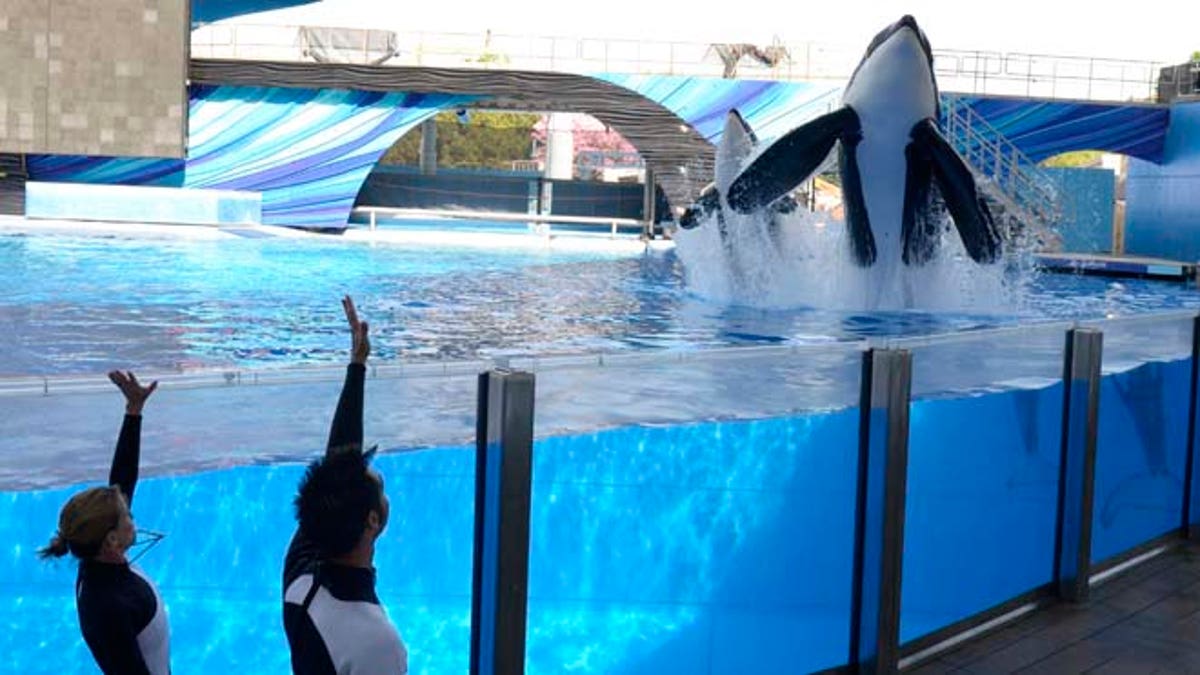
FILE - In a March 7, 2011, file photo, Kelly Flaherty Clark, left, director of animal training at SeaWorld Orlando, and trainer Joe Sanchez work with killer whales Tilikum, right, and Trua during a training session at the theme park's Shamu Stadium in Orlando, Fla. SeaWorld announced Thursday, March 17, 2016, it will immediately stop breeding killer whales, essentially phasing out the iconic orcas from its theme parks following years of controversy over keeping them in captivity. (AP Photo/Phelan M. Ebenhack, File)
ORLANDO, Fla. (AP) – Finally bowing to years of public pressure, SeaWorld announced Thursday that it will immediately stop breeding killer whales and making them perform crowd-pleasing tricks at its theme parks.
SeaWorld's remaining killer whales, or orcas, will still be on display, but in "new, inspiring natural orca encounters," rather than theatrical programs, the company said.
Attendance at SeaWorld's parks dropped after the 2013 release of the documentary "Blackfish," which was highly critical of the orca program. SeaWorld reported a fourth-quarter loss of $11 million in February.
"Society's attitudes have shifted," said Joel Manby, president and chief executive officer of SeaWorld Entertainment, Inc. during a telephone news conference. "It wasn't worth fighting that."
"We needed to move to where society was moving. That's why it's now and not two years in the future," Manby said.
The new shows will begin next year at the SeaWorld Entertainment Inc.'s San Diego park, before expanding to its San Antonio park and then to the Orlando, Florida, park in 2019.
Orcas have been a centerpiece of the SeaWorld parks since shows at the Shamu stadium in San Diego became the main draw in the 1970s, helping to make SeaWorld a top tourist attraction. The San Diego show was the original home of Shamu, SeaWorld's first orca.
But criticism over keeping them captive grew after an orca named Tilikum grabbed trainer Dawn Brancheau after a "Dine with Shamu" show and pulled her into the pool, killing her. That death in 2010 was highlighted in "Blackfish." Tilikum, who was also involved in the deaths of two other people in the 1990s, is now very sick. He has been at SeaWorld Orlando for 23 years.
Last month, SeaWorld acknowledged sending workers to infiltrate the animal rights group People for the Ethical Treatment of Animals, which has been particularly critical. At the time, Manby said the undercover workers had been sent to protect the safety of SeaWorld employees and customers, but he vowed to end the practice.
Now, SeaWorld hopes to turn a less strident foe into a collaborator — forming a partnership with the Humane Society to help educate guests about animal welfare and conservation through interpretive programs and expanded advocacy for wild whales, seals and other marine creatures.
Asked if SeaWorld may eventually decide to end shows involving dolphins and other marine mammals, Manby said, "Stay tuned on that."
"A lot of people don't understand how hard it is internally to make these kinds of decisions," he said. "We need to execute this well. We need to make sure we have the organization in the same direction. Then we will apply those learnings elsewhere."
Humane Society CEO Wayne Pacelle called SeaWorld's about-face a "monumental announcement."
"We don't come to this discussion with any naivete about the operations at SeaWorld," Pacelle said. "We didn't want to be endlessly mired in conflict with SeaWorld. The goal was to make progress for animal rights."
PETA wasn't satisfied, insisting Thursday that SeaWorld should give up its orcas altogether.
"SeaWorld must open its tanks to the oceans to allow the orcas it now holds captive to have some semblance of a life outside these prison tanks," PETA spokeswoman Colleen O'Brien said in a statement.
The Alliance for Marine Mammal Parks and Aquariums said it sympathizes with the decision by SeaWorld, a member of the Virginia-based trade group. The group's president and CEO Kathleen Dezio called SeaWorld "a principled company" and an industry leader, and said no company could withstand the prolonged protests that targeted its parks for nearly three years.
But SeaWorld has done more than any other organization to motivate people to care about orcas in the wild, Dezio's statement said, and losing opportunities to see them on display may threaten efforts to protect them in the long run.
By August 2014, SeaWorld said it would build new, larger environments for its marine mammals and fund additional research and conservation efforts. The project has yet to get off the ground.
Last October, the California Coastal Commission approved a $100 million expansion of SeaWorld's tanks for its orcas in San Diego but also banned breeding of the captive animals. SeaWorld said it would end the orca shows in San Diego by 2017, and the company also filed a lawsuit saying the California commission had overreached when it banned breeding at that park.
SeaWorld hasn't been alone in dealing with the public outrage that followed "Blackfish" and the 2009 documentary "The Cove," which showed the killing of dolphins in Japan. The National Aquarium in Baltimore announced in 2014 that it would explore retiring its eight dolphins to an oceanside sanctuary, and elected officials in some California cities passed resolutions stating that whales and dolphins have the right to freedom from captivity.
Rep. Adam Schiff, D-Calif., who introduced the Orca Responsibility and Care Advancement Act in 2015, applauded SeaWorld's announcement Thursday.
"These changes are something that advocates have been urging for years, and I think SeaWorld will find that visitors will reward their actions with a renewed interest in the parks," Schiff said in a statement Thursday.
